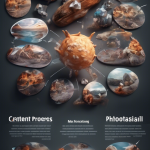The Role of Artificial Intelligence in Enhancing Affiliate Marketing Strategies
Revolutionizing affiliate marketing, artificial intelligence brings an array of sophisticated tools that streamline operations, enhance decision-making processes, and foster better connections between brands and consumers. Through advanced data analysis and automation, AI is redefining how affiliate marketers strategize and execute their campaigns.
Understanding Consumer Behavior with AI
One significant advantage of artificial intelligence in affiliate marketing is its ability to analyze vast amounts of data. By utilizing AI algorithms, businesses can gain deep insights into consumer behavior. Understanding what customers search for, their purchasing patterns, and preferences can help affiliate marketers tailor their campaigns effectively. This ensures that promotional efforts resonate with the audience. Here’s how AI contributes to this:
- Predictive Analytics: AI can forecast future buying habits based on historical data, allowing marketers to stay ahead of trends.
- Segmentation: Machine learning helps identify distinct audience segments, enabling personalized messaging that speaks directly to varied customer needs.
- Behavioral Targeting: By analyzing user interactions across platforms, AI picks up on cues that suggest when and how to target potential customers.
Content Creation and Curation
Creating content that attracts and engages is essential in affiliate marketing. AI tools assist in generating relevant content quicker and more efficiently. They can analyze popular topics and suggest content that resonates with the target demographic, enhancing organic reach. Here are some key contributions:
- Content Generation: AI-powered writing tools can produce articles, product descriptions, and social media posts tailored to specific keywords and styles.
- SEO Optimization: These tools can optimize content to ensure it ranks well in search engines, increasing visibility and traffic.
- Dynamic Recommendations: AI algorithms can suggest products to users based on their browsing history, enhancing the likelihood of affiliate conversions.
Enhancing User Experience
User experience plays a vital role in driving conversions. AI enhances this experience through personalized interactions. Chatbots, for instance, provide real-time assistance to users, answering inquiries and offering product suggestions. This not only improves customer satisfaction but also increases the chances of conversion. Key aspects include:
- 24/7 Availability: Chatbots provide constant support, addressing potential customer issues anytime, improving retention.
- Seamless Navigation: AI-driven analytics can highlight how users interact with websites, allowing for intelligent design adjustments that facilitate easier navigation.
- Personalized Offers: AI systems can deliver tailored discounts and promotions based on user behavior, encouraging purchases.
Performance Tracking and Optimization
Measuring the performance of affiliate marketing campaigns is crucial for success. AI tools simplify this process by providing real-time analytics and insights. Marketers can track key metrics, evaluate the effectiveness of various strategies, and make data-driven adjustments on the go. The benefits include:
- Real-time Data Analysis: AI processes data quickly, offering immediate feedback on the performance of campaigns.
- A/B Testing: AI can automatically perform A/B tests to identify which strategies yield better results, refining campaigns efficiently.
- Attribution Modeling: By analyzing multiple touchpoints in a customer’s journey, AI helps determine which channels most effectively drive conversions.
Cost Efficiency through Automation
Another substantial advantage of incorporating AI into affiliate marketing is its ability to automate repetitive tasks, linking it directly to improved cost efficiency. With automation, marketers can focus on strategic planning and creativity, leaving mundane tasks to AI systems. Some examples include:
- Automated Reports: AI tools generate reports automatically, saving time and ensuring accuracy.
- Automated Email Marketing: AI can help in segmenting email lists and scheduling campaigns tailored to user behavior.
- Lead Scoring: AI algorithms can score leads based on engagement and likelihood to convert, helping prioritize efforts.
By leveraging artificial intelligence, affiliate marketers can create more effective strategies that resonate with their audiences while streamlining their operations. As technology continues to evolve, embracing AI in affiliate marketing becomes not just advantageous but essential for staying competitive in an ever-changing landscape.
Effective Tools and Techniques for Affiliate Marketers Leveraging AI Technologies
In the rapidly evolving world of digital marketing, affiliate marketers are increasingly turning to artificial intelligence (AI) technologies to enhance their strategies and boost their earnings. By leveraging AI, affiliate marketers can streamline their operations, optimize campaigns, and gain valuable insights into consumer behavior. Below are some effective tools and techniques that can significantly enhance the affiliate marketing landscape.
Advanced Analytics for Improved Decision Making
AI-powered analytics tools allow marketers to dive deep into data trends and consumer behavior, offering actionable insights. These tools collect and analyze vast amounts of data to identify patterns that human analysts might miss. Here are some standout options:
- Google Analytics with AI Features: The latest updates offer predictive analytics capabilities, helping marketers foresee customer behaviors and trends.
- HubSpot: An all-in-one marketing solution that utilizes AI to provide insightful reports and easy tracking of marketing campaigns.
- Tableau: A powerful data visualization tool that uses AI algorithms to turn complex data into easily digestible visual formats.
Content Creation Using AI
Creating high-quality content is crucial for any affiliate marketer. AI writing assistants can help generate engaging blog posts, email newsletters, and social media content efficiently. Consider these options:
- Jasper: This AI writing tool helps create blog posts tailored to specific audiences, ensuring engagement and relevance.
- Copy.ai: Focused on producing high-conversion sales copy and product descriptions, this tool can significantly reduce writer’s block and enhance creativity.
- Grammarly: More than just a grammar checker, it utilizes AI to enhance writing style and clarity, ensuring quality content that resonates with readers.
Automated Marketing Campaigns
Automation has taken affiliate marketing to new heights. AI-driven platforms allow marketers to set up automated email campaigns and social media postings, which can save time and improve efficiency. Popular tools include:
- Mailchimp: Now equipped with AI features, it optimizes send times and personalizes content based on user interactions.
- Buffer: It simplifies social media management by scheduling posts while using AI to suggest optimal posting times.
- ActiveCampaign: This tool automates email marketing and provides predictive content recommendations tailored to user preferences.
Enhanced Customer Targeting
AI technologies can analyze customer data to create detailed buyer personas, improving targeting precision. By understanding your audience better, you can tailor your marketing strategies more effectively. Notable tools include:
- Facebook Ads Manager: Utilizes machine learning to optimize ad delivery and targeting to people likely to convert.
- AdRoll: Incorporates AI to retarget users who have previously engaged with your brand, boosting conversion rates.
- Segment: Collects data about customers from different channels and segments them for more informed targeting.
Chatbots and Customer Interaction
AI-driven chatbots have revolutionized how businesses interact with customers. They provide instant responses, answering queries and capturing leads at any hour. Some efficient options include:
- Drift: A chatbot designed for sales that engages visitors, answers questions, and books meetings, enhancing the customer journey.
- Intercom: Combines live chat and automation, using AI to direct inquiries, thus improving user experience.
- ManyChat: Specializes in Facebook Messenger, automating customer interactions and promoting brand engagement.
Personalization through AI
Personalization can significantly impact customer satisfaction and retention. AI allows marketers to tailor user experiences based on behaviors, preferences, and past interactions. Here’s how:
- Dynamic Content: Use AI tools to adjust content dynamically on websites or email, making it more appealing to individual users.
- Recommendation Engines: These suggest products based on a user’s previous interactions, enhancing the likelihood of conversions.
- A/B Testing with AI: Platforms like Optimizely use AI to run experiments and determine the most effective content or layout for conversions.
By integrating these advanced tools and techniques into their strategies, affiliate marketers can optimize their operations, improve their marketing accuracy, and ultimately drive better results. As AI technologies continue to mature, those who embrace these innovations will likely stay ahead in the competitive landscape of affiliate marketing.
Conclusion
As we navigate the ever-evolving landscape of digital marketing, it becomes increasingly clear that the integration of artificial intelligence into affiliate marketing strategies isn’t just beneficial—it’s essential. This synergy holds the potential to transform how marketers approach their campaigns and connect with their audiences. By leveraging AI, marketers can not only streamline their processes but also enhance their decision-making capabilities through rich data insights.
Through the lens of AI, affiliate marketers gain unprecedented access to analytics that offer a granular look at their performance. This includes understanding consumer behavior, predicting trends, and tailoring content to meet specific audience needs. For instance, AI tools can analyze past customer interactions to forecast future purchasing decisions, allowing marketers to stay one step ahead and deliver targeted campaigns. This proactive approach can significantly boost conversion rates, turning casual browsers into loyal customers.
Moreover, AI enhances personalization at scale, an increasingly critical component in today’s marketing strategies. In an era where consumers expect brands to speak directly to their preferences, AI-driven tools facilitate a level of customization that was previously unattainable. By creating individual customer journeys through tailored recommendations and content, affiliate marketers can cultivate deeper relationships with their audience. This leads to improved engagement, higher retention rates, and ultimately, greater revenue.
The effectiveness of these strategies is amplified by a range of AI-powered tools available in the market. Many platforms now provide robust functionalities enabling marketers to automate routine tasks and focus on strategic initiatives. From content creation plugins that assist with writing optimized affiliate texts to advanced analytics tools that help monitor real-time performance, these resources significantly reduce the workload. Marketers can spend less time on mundane tasks and dedicate more energy to creative, high-impact activities.
Additionally, AI simplifies the process of A/B testing, one of the essential techniques in the marketer’s toolbox. Traditionally, A/B testing required extensive manual intervention and analysis. However, AI’s ability to quickly analyze data patterns allows for continuous optimization of campaigns. Marketers can test multiple variations of a landing page or promotional email and utilize AI’s insights to instantly identify the most successful elements. This agility not only saves time but also increases the overall effectiveness of marketing efforts.
But the realm of AI in affiliate marketing extends beyond just enhancement of existing strategies; it serves to redefine what is possible. For example, natural language processing (NLP) technologies allow marketers to create chatbots that engage customers in real-time. These bots provide personalized recommendations, answer inquiries, and guide users through their purchasing journey efficiently. The result? Improved customer satisfaction and increased likelihood of conversions.
The application of AI doesn’t end there. Machine learning algorithms analyze vast amounts of data to optimize ad placements in real-time, ensuring that affiliate marketers reach their target audience where they are most likely to convert. The power of predictive analytics also enables marketers to anticipate consumer needs, allowing for timely and relevant content delivery. By understanding patterns and leveraging them in strategy development, marketers can achieve more successful outcomes.
Challenges do exist, of course. The implementation of AI demands investment and a willingness to adapt to new paradigms. Marketers must familiarize themselves with advanced tools and stay updated on ongoing developments in the AI field. Additionally, ethical considerations surrounding data privacy remain paramount, requiring marketers to navigate these waters with transparency and respect for user information.
Effectively leveraging AI technologies in affiliate marketing is not merely a trend but a necessary evolution for success in a competitive landscape. As we look to the future, those who embrace this technology will undoubtedly lead the charge, setting new benchmarks for performance and customer engagement. By harnessing the power of artificial intelligence, affiliate marketers can craft strategies that are not only effective but also dynamic, staying ahead in an industry defined by rapid change.
The intersection of affiliate marketing and AI paints an exciting picture for marketers eager to enhance their strategies. By equipping themselves with advanced tools and leveraging the capabilities of AI, marketers can achieve higher efficiency, increased personalization, and ultimately greater success in their campaigns. The future of affiliate marketing is bright, and it is being shaped by the innovative applications of artificial intelligence. Marketers who understand and adapt to this shift are not just surviving; they are thriving in this new digital era.


